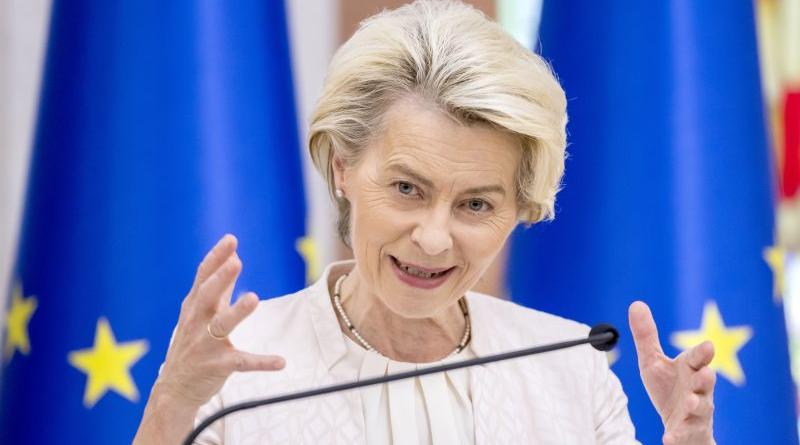Boiler wars: German spat over fossil heating ban comes to Brussels

A proposed EU-wide ban on new fossil heating systems as of 2029 is hanging in the balance as a German spat over boilers spilled over into Brussels, presenting European Commission President Ursula von der Leyen with a tough choice.
Germany is in the throes of a fight over whether fossil heating systems should be banned from 2024. Now, attention is turning towards Brussels, where a similar plan has been in the works for years.
REPowerEU, the Commission’s plan to end dependence on Russian fossil fuels by 2030, “will be the speed-charging for our European Green Deal” von der Leyen announced in May 2022 after the Russian invasion of Ukraine.
But one provision of that plan, the ‘Save Energy’ communication, has become politicised by the German boiler war. The communication foresaw the “setting of stricter ecodesign limits for heating systems at EU level, implying 2029 as an end date for ‘stand-alone’ fossil fuel boilers being placed on the market”.
In April 2023, a working group set up by the European Commission came up with a definition of what that would mean in practice: creating an energy efficiency standard of 115% that traditional heating systems are incapable of reaching.
Going over 100% energy efficiency is physically impossible for gas and oil heaters, but easily achievable for heat pumps, which can turn one unit of energy into four units of heat.
Tabloids causing a stir
Those plans didn’t go unnoticed by the German tabloid press.
“EU plans tougher heating hammer than Habeck” was the headline of Germany’s biggest tabloid newspaper, BILD.
The article, published on 7 June, quoted Germany’s business-friendly FDP expressing worries that Brussels would abolish hard-fought exemptions for heating systems running on hydrogen or e-fuels that were inserted in the German law. Indeed, all hydrogen-based heating solutions would fail the 115% test.
“I think that what is supposed to come from Brussels is a scandal! Ms von der Leyen would torpedo everything we are trying to achieve here in Germany,” FDP chief whip Christian Dürr told BILD.
The article prompted an immediate reaction from Brussels, with officials in von der Leyen’s cabinet allegedly pushing the Commission’s representation in Germany to quickly publish a “debunk” of the tabloid article – an unusual response on the part of the EU executive, which tends not to comment on media coverage.
The basis of the Commission’s proposed ban is the 2009 Ecodesign Directive, which is currently being revised. Experts in one of the working groups set up under the directive have been discussing new efficiency standards for heating systems since several years, and an initial agreement was achieved in April 2023.
The agreement established the 115% requirement, and the Commission is now looking for majority support among the 27 EU countries to write the standard into law, using a so-called Implementing Act.
“The draft Implementing Act is still currently under discussion with the EU countries and associations and has to obtain support from a qualified majority of Member States,” a Commission spokesperson told EURACTIV.
Political conundrum
Politically, the situation looks more complicated though, with the German boiler spat putting the Commission President in a difficult position one year ahead of the European elections.
Von der Leyen has yet to announce whether she will seek a second term as the head of the EU executive and run for her political family, the centre-right European People’s Party (EPP).
However, doing so would first require Germany to officially designate her as commissioner-candidate and the ruling coalition in Berlin – composed of Socialists, Greens and Liberals – has no immediate interest in nominating her.
To be sure, a dispute over boilers would not help her case in Berlin where the boiler war has acted like water on the mills for the far-right.
Brussels is therefore treading carefully on the proposed new boiler standards.
‘Political resistance is fierce’
On Monday (12 June), national representatives and experts taking part in the Commission’s working group held another meeting to discuss the proposed EU-wide boiler standards.
“This is her last chance” to pass a ban on fossil fuel boilers, said one source involved in the talks, calling the measure a “necessary” move in the face of the climate emergency.
Others, meanwhile, say the Commission has given up to pressure from EU countries and is ready to compromise.
Thomas Nowak, general secretary of the European heat pump association EHPA, called the meeting “disappointing”, saying representatives from the 27 EU countries have listed “numerous reasons as to why a boiler ban from 2029 is politically and economically not feasible”.
The European Commission should “move ahead” with more ambitious boiler standards, but “political resistance is fierce”, Nowak said.
The question now is whether Brussels will go ahead with a ban or not. Several sources close to the process said the Commission has signalled openness to making changes requested by EU countries.
“The Commission will not make any decisions on limits before the conclusion of the ongoing consultation procedures and discussions, but will decide in the light of the results,” said a spokesperson for the EU executive.
cover photo:European Commission President Ursula von der Leyen is under pressure, with German lawmakers and EU countries criticising a planned 2029 ban on fossil heaters in the EU. [EPA-EFE/DUMITRU DORU]





